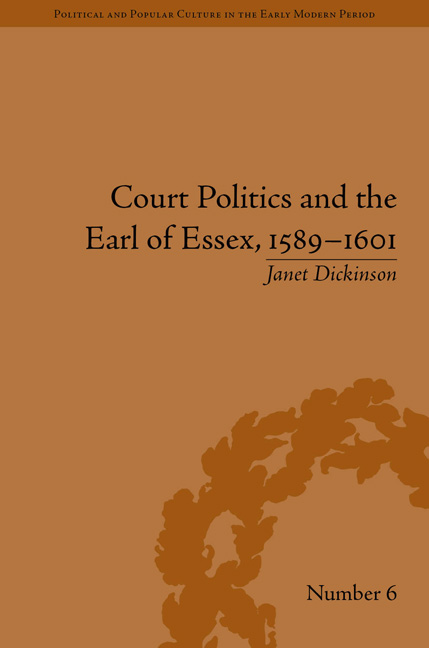Book contents
- Frontmatter
- CONTENTS
- Dedication
- Acknowledgements
- Introduction
- 1 Chivalric Culture and the Earl of Essex
- 2 The Virgin Queen and Her Lovers
- 3 ‘This Late Unhappy Accident’: The Rebellion of 1601
- 4 Faction in the 1590s?
- 5 Essex and Cecil
- 6 Essex and the Essexians
- 7 Elizabeth's Last Decade: Cult or Crisis?
- Notes
- Bibliography
- Index
6 - Essex and the Essexians
- Frontmatter
- CONTENTS
- Dedication
- Acknowledgements
- Introduction
- 1 Chivalric Culture and the Earl of Essex
- 2 The Virgin Queen and Her Lovers
- 3 ‘This Late Unhappy Accident’: The Rebellion of 1601
- 4 Faction in the 1590s?
- 5 Essex and Cecil
- 6 Essex and the Essexians
- 7 Elizabeth's Last Decade: Cult or Crisis?
- Notes
- Bibliography
- Index
Summary
There was amongst his nearest attendants, one Henry Cuffe a man of secret Ambitious ends of his own, and of proportionate Counsels smothered under the habit of a Scholar, and slubbered over with a certain rude and clownish fashion, that had the semblance of integrity.
Among his contemporaries, there was little doubt that Essex was guilty of unforgivable acts in February 1601, but there was also a strong belief that his transgressions were the consequence of the pressure placed upon the earl by his followers, notably his sister, Penelope Rich, and Henry Cuffe, one of Essex's secretaries. Essex's accusations against his sister were reported to her long-term lover, Charles Blount, Lord Mountjoy, a former friend of Essex, away in Ireland at the head of the Queen's army at the time of the rebellion. The Earl of Nottingham described to Mountjoy how, at his trial, Essex had accused his sister of having ‘continually’ urged him on ‘with telling me how all my friends and followers thought me a coward, and that I had lost all my valour’. Rich was confined and questioned before being cleared of involvement, very possibly as a result of an intervention by Mountjoy, whose service in Ireland was vitally important to the regime. She wrote to Mountjoy of her gratitude for ‘your late kindnesses’, saying of her relationship with Essex ‘that I have been more like a slave than a sister; which proceedeth out of my exceeding love’.
- Type
- Chapter
- Information
- Court Politics and the Earl of Essex, 1589–1601 , pp. 99 - 114Publisher: Pickering & ChattoFirst published in: 2014



